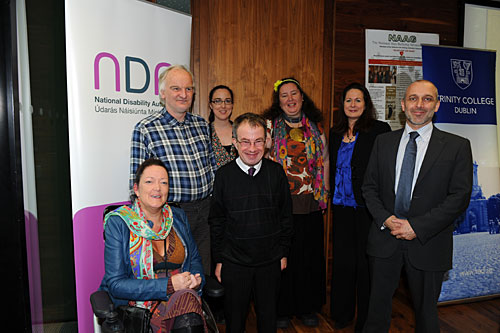Report into Bullying of People with Intellectual Disabilities and Bullying Information Guide Launched
Posted on: 07 November 2012
A report into Bullying of People with Intellectual Disabilities and an Easy to Read Bullying Information Guide, compiled by the National Institute for Intellectual Disability (NIID), Trinity College Dublin in association with the National Anti-Bullying Advocacy Group (NAAG), was launched o recent by the Director of the National Disability Authority, Siobhan Barron.
Bullying is a regular, long term occurrence for the vast majority of people with intellectual disabilities. People in this group are far more likely to be bullied than their non-disabled peers. Over the past 12 months The National Institute for Intellectual Disability (NIID) and the National Anti-Bullying Advocacy Group (NAAG) researched and developed an accessible anti-bullying guide for people with intellectual disabilities.

L-R Ms Fiona Weldon (member of NAAG), Mr. Conn O’Rathaille (member of NAAG), Ms. Siobhain O’Doherty (formerly a Research Assistant, NIID), Mr William Roberts (member of NAAG), Ms Marie Wolfe (member of NAAG), Ms. Siobhain Barron (Director of NDA) and Dr. Fintan Sheerin (Acting Director, NIID).
The report identifies that bullying is an important issue for people with intellectual disabilities and that it had a significant effect on the ability of individuals to live a life grounded in self-control, choice and inclusion. The research led to the development and publication of an Easy to Read Bullying Information Guide to support people with intellectual disabilities and to advise on how to identify bullying in their own lives and strategies to address it.
“This report is particularly timely in light of the recent public attention which has focused on bullying among teenagers,” stated the Director (Acting) of National Institute for Intellectual Disability, Dr Fintan Sheerin. “It demonstrates that bullying is more pervasive than is often thought and for people with an intellectual disability it may be experienced almost anywhere in life – in interpersonal relationships, in service provision, in the community as well as at the interface between the State and the citizen.”
